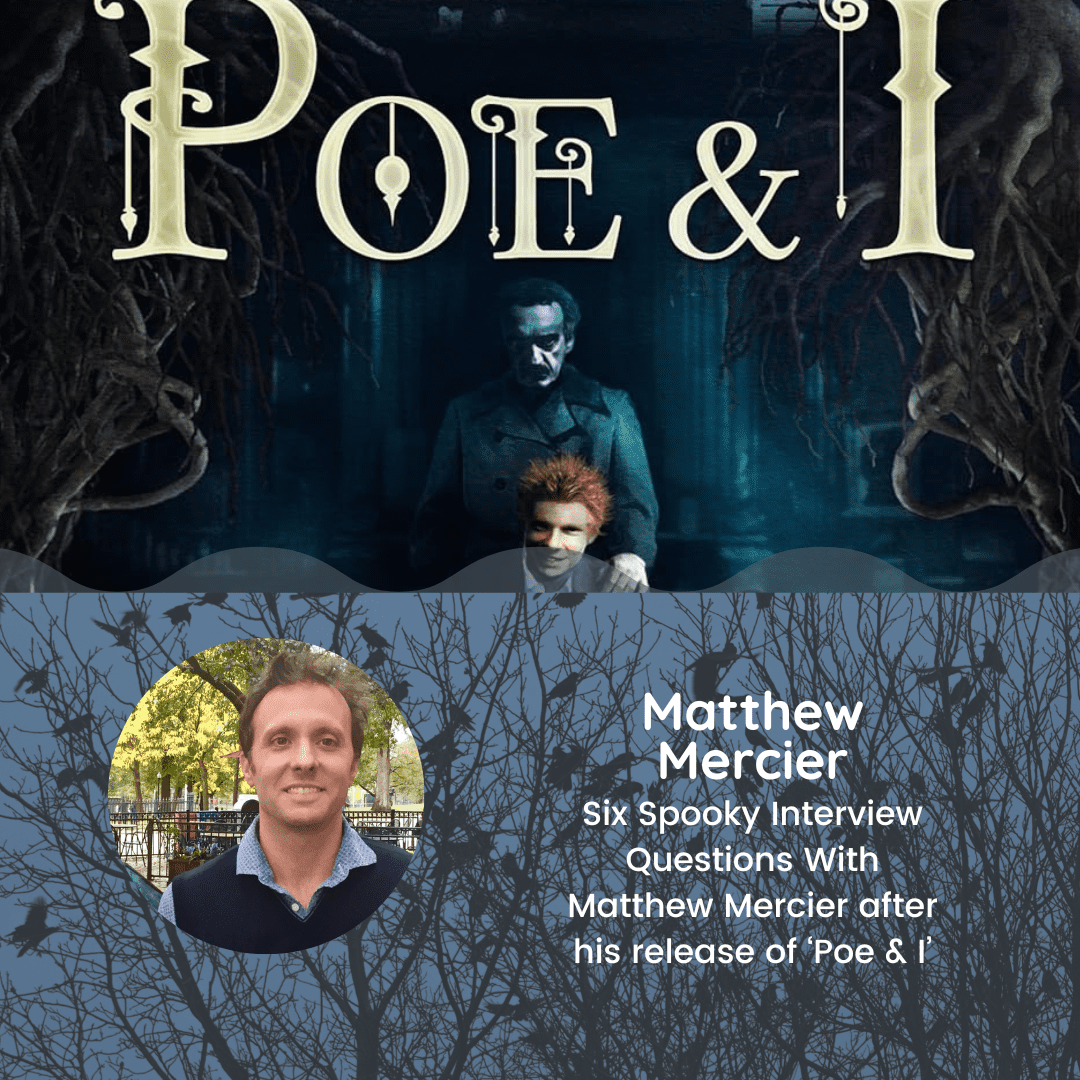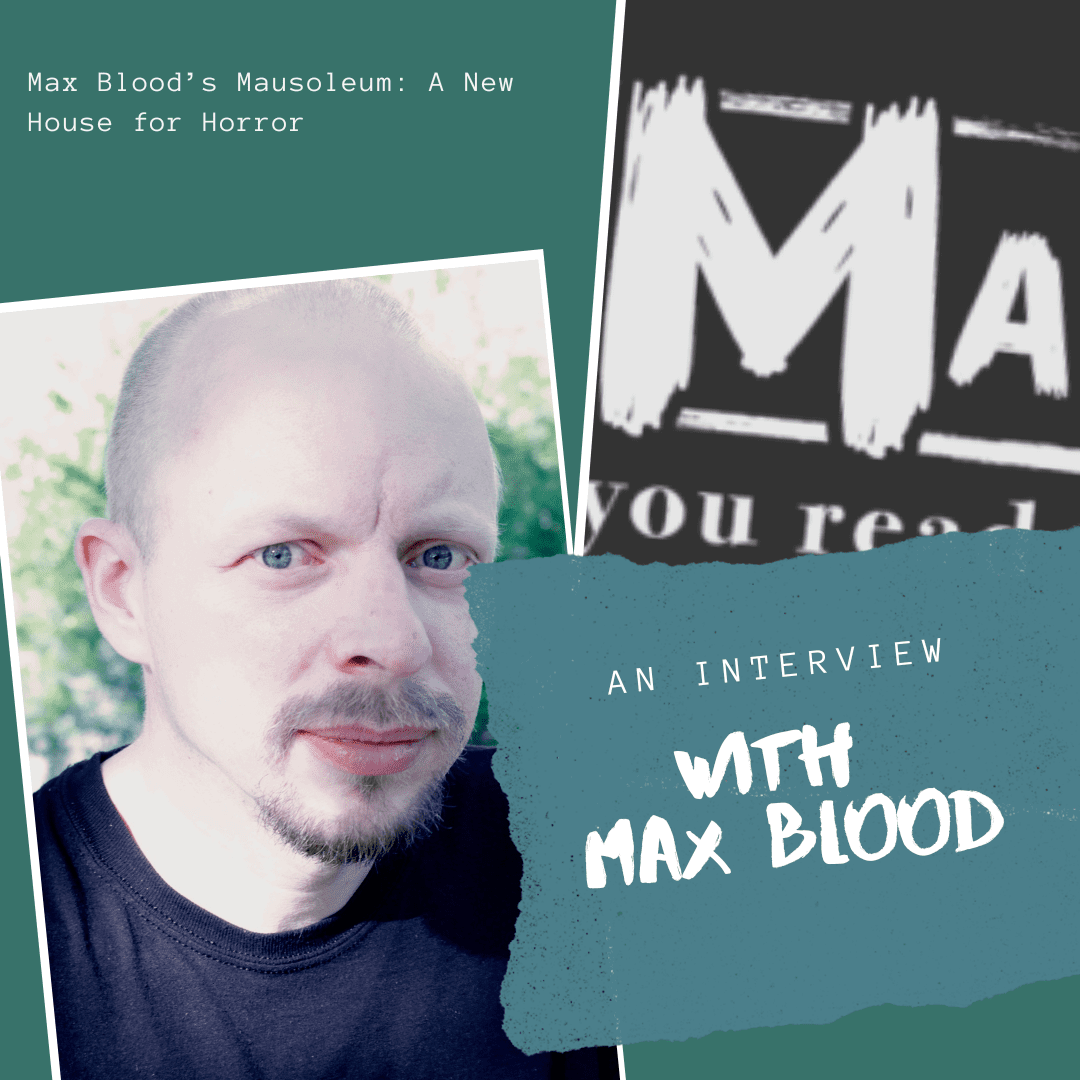The Spooky Six with Matthew Mercier and Willow Croft

How often do you get to sit down with a fellow author who’s lived in Edgar Allan Poe’s basement? Naturally, I was thrilled to interview Matthew Mercier and, perhaps after the interview’s wrapped, he’ll take me mushroom hunting–an adventure that is totally on my bucket list!
Matthew Mercier (he/him) is a writer and storyteller living in the haunted Hudson Valley, the beautiful home of Rip Van Winkle, Ichabod Crane & The Headless Horseman, the historical ghosts of the Underground Railroad, and what the horror community should now, in his opinion, affectionally call “Langan Country”, as a tribute to the work of horror master John Langan.
Before building a home with his wife in a lovely piece of fairy tale forest, he worked as a tour guide at the Mystic Aquarium in Connecticut, (where he grew up), ran a youth hostel in Albuquerque, New Mexico, was slimed as a salmon packer in Naknek, Alaska, provided showers for homeless men on the Bowery, and proudly served three years as head docent and caretaker for the Edgar Allan Poe Cottage in The Bronx, an experience that became the basis for his debut novel Poe & I, published by Crystal Lake Publishing on July 19th, 2024.
He now spends his days writing, cooking, playing with his cats Ursula and Bombadil, and hunting for mushrooms after a good rainstorm. He is a mycological evangelical since fungi are the future and are of great benefit to humanity and ecosystems. And yes, he knows the poisonous ones that will kill you.
On a more pragmatic note, he earned an MFA from Hunter College where he taught writing and children’s literature. His work has appeared in various magazines such as Creative Nonfiction, The Fairy Tale Review, Shotgun Honey, and Mystery Tribune.
He’s performed stories live on stage with The Moth, and he’s been heard on NPR’s The Moth Radio Hour, as well The Story Collider, RISK and The Truth podcasts. He’s also been awarded the Leon B. Burstein scholarship from the New York chapter of the Mystery Writers of America, and a residency from the Saltonstall Foundation.
Currently, he is writing and producing radio dramas for Radio Free Rhinecliff in Rhinecliff, NY.
For more information, visit him at https://www.matthewmercier.com.
https://www.instagram.com/matthew.mercier.poem/
https://bookshop.org/p/books/poe-i-matthew-mercier/21660269?ean=9781964398136
https://www.amazon.com/Poe-I-Matthew-Mercier/dp/1964398134

Willow Croft: “Hey, look at that derelict Victorian mansion . . . let’s go explore it!” What’s the most unusual setting you’ve read about in a horror/thriller book, or included in your own creative works?
Matthew Mercier: Well, at the risk of tooting my own horn, I did live in Edgar Allan Poe’s basement, and used that for the basis of my first novel, Poe & I. That cottage—and that basement—was by far the strangest place I’ve ever lived, so it was the perfect launchpad for a fictional playground. I only had one window, and the noise of the outside world was sealed off pretty well, so it was a disorienting experience living and sleeping down there. Climbing up into the organized chaos of The Bronx was always a shock, and I’ve tried to capture that off-kilter strangeness in my novel.
Half the fun of living in Poe Cottage was waking up in my primary place of employment and walking upstairs to give the tours. That never got old, or any less weird. And if tourists figured out that I lived below the museum, well, the look on their face was priceless. I doubt I will ever occupy a space that weird and singular ever again, short of my own grave—and hopefully I will not be conscious for that final ride.
As for settings that are not my own, one of my favorites of all time is from Arkady & Boris Strugatsky’s Roadside Picnic— The Zone, a forbidden area full of extraterrestrial artifacts, is a marvelous piece of invention. Victor LaValle also creates wonderful environments for his novels, be it a fairy tale New York or a haunted psych ward. And V. Castro right now is tearing it up with each and every book, giving us a Chicano spin on old tales and settings with truck stops, night clubs, and porn movie sets.
Willow Croft: “It was a dark and stormy night . . .” What are your go-to comfort foods, drinks, or other ways to wind down after a long day (or night) of writing?
Matthew Mercier: A pesto dish made with fresh basil from the garden. Pesto anything really. I’ll eat it straight from the jar. And for dessert, blueberries and cream and a non-alcoholic beer. (I gave up alcohol a long time ago for health reasons.)
Willow Croft: “Did you hear that noise?” Everyone, even us horror/suspense writers, have our night terrors. What is it that frightens you the most?
Matthew Mercier: When I was a boy, I fell into a pond with a water snake chasing me across the surface, so ever since I have not been fond of serpents or anything that squirms or slithers, even though I’m aware of their important role in the ecosystem. I now live in the woods and appreciate everything that crawls, bites, slithers, and flies, and while I’ve tried to temper my inner-Indiana Jones, I won’t be going to the Amazon anytime soon.
However, even scarier than anything in Nature is the latent fascism of my fellow citizens, which has risen to the surface in the last ten years. What’s enormously frightening is how banal these people are. You have feeble old grandparents messing with the election boards, and just nodding along with all the chaos and racism, cocooned in their suburban bubbles.
There you go. Fascism and snakes. Let’s keep the snakes and punch the Nazis.

Willow Croft: “I’m sure it was nothing. But I’ll just go outside and check, anyway. Alone. With no weapons.” Have you ever gotten writers’ block? If so, how do you combat it? Do you have certain rituals or practices that help get you into the writing (or creating) mindset?
Matthew Mercier: My controversial hot take on writer’s block is that it doesn’t exist. I think it’s what we tell ourselves if we don’t want to work. Honestly, every novel—every story—gets blocked at some point, so it’s just a matter of being patient and waiting until the story reveals itself. I tend to work on multiple projects simultaneously, so if I do get blocked on something I just hop over to another project and that breaks open my brain.
For example, I recently started a new novel and got 50K words in before I realized it wasn’t working. I needed a plan, so I put that book on hold and began outlining. In the meantime, I jumped over to a bunch of short stories that were half-finished, and I started editing an audio drama that I created. It seems disorganized, but you have to listen to that inner voice and not get caught up trying to ram a project through.
As for a special ritual, I wish I had one. I need a meditation practice or something to calm my mind, but usually I just make a cup of coffee, listen to some music to get me in a good mood, and then get straight to work.
Willow Croft: “Don’t go into the basement!” Are you an impulsive pantser or a plotter with outlines galore? What other writing/industry advice would you share with your fellow writers & creators?
Matthew Mercier: I used to be a pantser, but now that I’m older, I tend to outline more. I think you waste less time, especially with novels.
My major piece of advice would be to get off social media, focus on your craft and live deeply. Make good friends, both in the writing community and outside. This will make your writing richer in so many subtle ways. Don’t imagine that you have to live the life of monk in order to write.
And try to tap into your subconscious mind. That’s where the juicy stuff lives, and the AI robots don’t have access to that glorious story catalog living in your head.
Willow Croft: “Ring ring!” It’s the middle of the night and the phone mysteriously rings. Which notable writer, or person from history, would be on the other end of the line?
Matthew Mercier: I would love to have chatted and traded jokes with Kurt Vonnegut. Alas. So it goes. Maybe we’ll get unstuck in time together and meet on Tralfamadore.
There are so many others, but my other top picks would be Shirley Jackson and Rod Serling. I’m also a huge fan of the writings of Thomas Merton, a Trappist Monk, which may seem to be a left field recommendation from a horror writer, but his essays and ideas have always been alive for me. His writings were so prescient, and he was a brilliant mind gone too soon.












